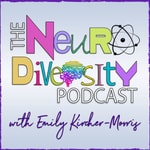Neurodiversity Podcast – Details, episodes & analysis
Podcast details
Technical and general information from the podcast's RSS feed.

Neurodiversity Podcast
Emily Kircher-Morris
Frequency: 1 episode/10d. Total Eps: 280

Recent rankings
Latest chart positions across Apple Podcasts and Spotify rankings.
Apple Podcasts
🇨🇦 Canada - mentalHealth
29/07/2025#55🇺🇸 USA - mentalHealth
29/07/2025#93🇨🇦 Canada - mentalHealth
28/07/2025#76🇨🇦 Canada - mentalHealth
26/07/2025#76🇺🇸 USA - mentalHealth
25/07/2025#96🇺🇸 USA - mentalHealth
24/07/2025#96🇺🇸 USA - mentalHealth
23/07/2025#89🇺🇸 USA - mentalHealth
22/07/2025#94🇺🇸 USA - mentalHealth
21/07/2025#91🇬🇧 Great Britain - mentalHealth
20/07/2025#81
Spotify
No recent rankings available
Shared links between episodes and podcasts
Links found in episode descriptions and other podcasts that share them.
See all- https://www.instagram.com/stories
1728 shares
- https://www.instagram.com/robyn.gobbel
320 shares
- https://www.instagram.com/impactparents
218 shares
- https://www.adhdrewired.com/
118 shares
- http://www.mindmatterspodcast.com
78 shares
RSS feed quality and score
Technical evaluation of the podcast's RSS feed quality and structure.
See allScore global : 58%
Publication history
Monthly episode publishing history over the past years.
Autistic Voices: Bridging the Communication Gap
Episode 239
jeudi 29 août 2024 • Duration 33:55
Miscommunication between autistic and non-autistic individuals can lead to painful misunderstandings and strained relationships. In this episode, we talk to Jaime A. Heidel, author of 'What Did I Do Wrong? An Accessible Guide to Preventing Traumatic Misunderstandings Between You and Your Autistic Loved One.' Emily and Jaime discuss the common communication barriers between autistic and non-autistic people, the importance of listening to autistic voices, and the need for effective communication to prevent trauma. They talk about the need for specificity in communication, and the impact of trauma and the importance of validating neurodivergent experiences.
Takeaways
-
Miscommunication between autistic and non-autistic individuals can lead to painful misunderstandings and strained relationships.
-
Listening to autistic voices and consuming their content can help improve understanding and foster better connections.
-
Believing autistic individuals and being specific in communication can greatly improve communication and prevent trauma.
-
The impact of trauma on neurodivergent individuals is real, and it’s important to validate their experiences.
Register here for our free annual fall event we’ve created specifically for educators who are passionate about creating neurodiversity-affirming learning environments for students. The event will be held on Monday, September 23, and you can sign up to join Emily and a live panel of experts, who will be discussing ways to best support students of all neurotypes.
Jaime A. Heidel, The Articulate Autistic, is a late-diagnosed autistic/ADHD woman who uses her social media platforms to explain the autistic experience in terms that their neurotypical loved ones can understand and relate to.
BACKGROUND READING
Improving Math Education for Neurodivergent Learners
Episode 238
jeudi 22 août 2024 • Duration 40:37
On episode 238, Emily Kircher-Morris talks with Lindsay Kapek and Katie Tabari about the challenges neurodivergent students face in learning math. The conversation explores strategies for creating inclusive math classrooms that foster confidence and support for all students, regardless of their neurodivergence, and they talk about the importance of understanding individual learning styles. They also discuss using low floor, high ceiling tasks and three-act tasks to engage students and promote problem-solving skills. If you’re a teacher, or if you have kids in school, this is an episode you can’t miss.
Takeaways
-
Neurodivergent students face barriers in math education, but their unique traits can be leveraged as assets.
-
Creating a supportive and inclusive math classroom starts with building a connection with students.
-
Implementing strategies like low floor, high ceiling tasks and three-act tasks can engage students and promote problem-solving skills.
-
Language and mindset play a crucial role in fostering confidence and growth in math.
-
Understanding students' learning styles and providing individualized support is essential for their success.
Register here for our free annual fall event we’ve created specifically for educators who are passionate about creating neurodiversity-affirming learning environments for students. The event will be held on Monday, September 23, and you can sign up to join Emily and a live panel of experts, who will be discussing ways to best support students of all neurotypes.
Lindsay Kapek and Katie Tabari are experienced K-8 math educators with a passion for making math accessible to all students. They are accomplished leaders in education, leading school-wide professional development efforts, consulting with schools and school leaders regarding the implementation of skill-based instruction, and speaking nationwide at conferences including NWAIS as well as NCTM.
Katie has extensive experience working with K-5 students, nearly all of whom were neurodivergent learners. She is also a mom to three kids, one of whom is neurodivergent. She is passionate about ensuring every student feels seen, heard, and included in the math classroom.
Lindsay has extensive experience working with K-8 students who have been diagnosed with ADHD. Lindsay herself has ADHD and is a huge advocate for celebrating the incredible gifts that students with ADHD bring to the math classroom.
BACKGROUND READING
Measuring Thinking Rather Than Knowledge with Dr. Jack Naglieri (part 1)
Episode 229
jeudi 20 juin 2024 • Duration 27:55
As part of our two-part series, we are speaking with Dr. Jack Naglieri, an emeritus professor at George Mason University and senior research scientist at the Devereux Center for Resilient Children. Dr. Naglieri is renowned for his work in intelligence testing and the development of the Naglieri Nonverbal Ability Test.
In this episode, part one of the interview, he and Emily talk about his insights on the evolution and misconceptions surrounding intelligence assessment. They delve into the history of intelligence testing, highlighting the limitations and biases inherent in traditional methods. He describes the experiences that led him to question the validity of verbal-based intelligence tests, and ultimately inspired his development of nonverbal assessment tools. Dr. Naglieri describes how and why his tests aim to measure thinking rather than knowing, and how it provides a more equitable approach to assessing intelligence.
They discuss the PASS theory of intelligence, and how it forms the foundation of the Cognitive Assessment System (CAS), a tool designed to measure these processes and offer a nuanced profile of an individual's cognitive strengths and weaknesses.
They cover much more as well, it’s an enlightening conversation about how we measure intelligence. Look for part two of the chat in episode 230. Feel free to download a free copy of PASS Theory of Intelligence and the CAS2.
Our courses in the Neurodiversity University are 50% off right now, for a limited time. Click here, and use the promo code SUMMER24.
Dr. Jack A. Naglieri, Ph.D., is Emeritus Professor at George Mason University and Senior Research Scientist at the Devereux Center for Resilient Children. His main interest is the development of psychological and educational tests and the implications these approaches have for accurate and equitable assessment.
He has published about 25 books, 50 tests and rating scales, and approximately 300 research papers. Jack is the author of tests used for identification of gifted students, including the Naglieri Nonverbal Ability Test. He partnered with Dina Brulles and Kim Lansdowne to coauthor the Naglieri Tests of General Ability Verbal, Quantitative and Nonverbal, and the book, Understanding and Using the Naglieri General Ability Tests: A Call to Equity in Gifted Education (Brulles, Lansdowne & Naglieri, 2022).
Dr. Naglieri has received many awards for his extensive research program that includes scholarly research, books, and psychological tests with an emphasis on uniting sound theory with equitable scientific practice.
BACKGROUND READING
Depression and Suicide in the Neurodiversity Community
Episode 139
lundi 26 septembre 2022 • Duration 31:14
On episode 139, as part of Suicide Prevention and Awareness Month, we address depression and suicide among neurodivergent people. We talk about intervention techniques that can help parents, teachers, or anyone who interacts with neurodivergent people to understand and support them through trauma, depression, and suicidal ideation. We are joined by Kelsie Bacon, a licensed clinical counselor and play therapist who works with young neurodivergent people to help them feel connected and supported.
Also, if you’re an educator, we have a great continuing education course called Strategies for Supporting Twice-Exceptional Students. Here’s the link to pre-order the course for independent study at a 20% discount! If you’re an administrator and want to utilize it district-wide, click this link and we’ll get in touch and answer your questions. All of the details are at www.Neurodiversity.University.
ABOUT THE GUEST - Kelsie Bacon, LCSW-S, RPT, is a Licensed Clinical Social Worker serving the Albuquerque, NM area. She graduated from UNM with a B.A. in Psychology and Family Studies and received her master’s degree from New Mexico Highlands University in Clinical Social Work. She’s currently earning her certification as a Registered Play Therapist.
She provides school-based and agency-based therapeutic interventions for children, adolescents and teens. She utilizes DIRFloortime techniques with many clients, and finds it particularly rewarding to work with teenagers to help them feel understood and supported.
Sorting Out Sensory Awareness
Episode 138
jeudi 15 septembre 2022 • Duration 35:37
Many people don’t realize they’re neurodivergent until adulthood, after dealing with sensory sensitivities their entire lives. Robert Jason Grant joins us to talk about the various types of sensitivities, how to identify them, and how to cope with and accept them. We also dispel some popular myths, and talk about one of the lesser-known senses, interoception.
Also, if you’re an educator, we have a great continuing education course called Strategies for Supporting Twice-Exceptional Students. Here’s the link to pre-order the course for independent study at a 20% discount! If you’re an administrator and want to utilize it district-wide, click this link and we’ll get in touch and answer your questions. All of the details are at www.Neurodiversity.University.
ABOUT THE GUEST - Dr. Robert Jason Grant is a licensed Professional Counselor, National Certified Counselor, Registered Play Therapist Supervisor, and Advanced Certified Autism Specialist. He owns and operates the Robert Jason Grant Ed.D AutPlay Therapy Clinic.
Dr. Grant is an international speaker and keynote presenter having presented for the American Counseling Association, Association for Play Therapy, American Mental Health Counselors Association, and The World Autism Congress. He is a multi-published author of several articles, book chapters, and books.
Ask Me Anything #2 with Emily Kircher-Morris
Episode 137
jeudi 8 septembre 2022 • Duration 20:51
We take questions from people in the Neurodiversity Podcast Advocacy and Support Group on Facebook, and Emily answers them. This is our second AMA, and you’re invited to take part in future ones. Look us up on any of our social media channels for details and to find out how to participate.
Here’s the link to pre-order Strategies for Supporting Twice-Exceptional Students for independent study. Anyone can take the course, and if you register now you’ll receive 20% off the tuition.
You can support the podcast at www.patreon.com/neurodiversity. The Neurodiversity Podcast is on Facebook, Instagram, Twitter, and you’re invited to join our Facebook Group. For more information go to www.NeurodiversityPodcast.com
Thank you for caring about neurodivergent people.
Mentoring Tweens Through Transitions
Episode 136
jeudi 25 août 2022 • Duration 32:38
As parents and educators prepare for the start of the new school year, middle schools everywhere are welcoming a new crop of excited, nervous, and sometimes unprepared kids. On episode 136 we talk about the middle school transition, and the changes parents can expect to see as their kids adapt to their new surroundings. Guest Phyllis Fagell is the author of Middle School Matters, and she joins us with ideas and advice. (This conversation is also featured in episode 38.)
Here’s the link to pre-order Strategies for Supporting Twice-Exceptional Students for independent study. Anyone can take the course, and if you register now you’ll receive 20% off the tuition.
ABOUT THE GUEST
Phyllis Fagell is a Licensed Clinical Professional Counselor, Certified Professional School Counselor and journalist. She has worked in both public and private schools with students in grades K-12, focusing on middle school for the last several years. She currently works full time as the school counselor for Sheridan School in Washington, D.C. Sheridan School has been named a 2017 National School of Character. Phyllis also provides therapy to children, teens and adults in private practice at the Chrysalis Group, Inc.
As a journalist, Phyllis writes regular columns for The Washington Post on counseling, parenting and education. She writes a weekly advice column for PDK, Intl. for educators, and she blogs for a number of highly-respected national education associations and counseling publications, including AMLE (Association of Middle Level Educators) and Character.org. Her articles often are syndicated by Bloomberg, and they also are reprinted by newspapers throughout the world.
BACKGROUND READING
You can support the podcast at www.patreon.com/neurodiversity. The Neurodiversity Podcast is on Facebook, Instagram, Twitter, and you’re invited to join our Facebook Group. For more information go to www.NeurodiversityPodcast.com
Thank you for caring about neurodivergent people.
The World is (almost) Ready For Neurodiversity
Episode 135
jeudi 18 août 2022 • Duration 37:46
Acting differently, speaking differently, or following different social rules, doesn’t make someone less human or deserving of respect. On episode 135, Dr. Barry Prizant joins Emily Kircher-Morris to talk about his work moving the world of neurodiversity forward, and how we can continue advancing society toward equality and respect for everyone, regardless of their wiring.
Also, here's a link to our continuing education and professional development course for school district gifted/twice-exceptional programs. It's a 15-hour, 6-module course called “Strategies for Supporting Twice-Exceptional Students,” by Emily Kircher-Morris. Learn more and get it for your district at Neurodiversity University.
Join our Facebook group https://www.facebook.com/groups/neurodiversitypodcast
ABOUT THE GUEST - Barry M. Prizant, PhD, CCC-SLP is among the world’s leading authorities on autism and neurodevelopmental conditions, and is recognized as an innovator of respectful, person- and family-centered approaches for autistic and neurodivergent individuals and their families. With fifty years of experience as a clinical scholar, researcher, and international consultant, he is a Visiting Scholar at Brown University, a certified speech-language pathologist, and director of Childhood Communication Services at his private practice.
Barry is coauthor of The SCERTS Model: A Comprehensive Educational Approach, now being implemented in more than a dozen countries. He has published four books, more than 140 articles and chapters and has received many awards, including the Honors of the American-Speech-Language-Hearing Association (their highest recognition), the Princeton University Eden Foundation career award for improving quality of life for persons on the autism spectrum, and the Divine Neurotypical Award of GRASP, the world's largest autistic self-advocacy organization. He has been a two-time featured presenter at the United Nations on World Autism Awareness Day.
His recent best-selling book, Uniquely Human: A Different Way of Seeing Autism is now published in 22 languages, and he co-hosts and co-produces Uniquely Human: The Podcast.
Sensory Sensitivities, Parenting, and Neurodiversity
Episode 134
jeudi 11 août 2022 • Duration 33:47
With neurodiversity comes a host of extra effects, sensitivities, and challenges. Parenting a neurodivergent child can require a willingness to reconsider your perspective and sometimes even change your environment, in order to help ease stress and anxiety. Jen Malia, author of TOO STICKY!, is here to lend her perspective as both a parent of neurodivergent kids, and as a neurodivergent person with her own sensitivities and challenges.
Also, here's a link to our continuing education and professional development course for school district gifted/twice-exceptional programs. It's a 15-hour, 6-module course called “Strategies for Supporting Twice-Exceptional Students,” by Emily Kircher-Morris. Learn more and get it for your district at Neurodiversity University.
Join our Facebook group! https://www.facebook.com/groups/neurodiversitypodcast
You can support the podcast and receive subscriber-only benefits at www.patreon.com/neurodiversity
ABOUT THE GUEST - Jen Malia is the author of TOO STICKY! Sensory Issues with Autism, a children's picture book based on her own and her younger daughter's experiences living with autism and sensory differences. She is Associate Professor of English and Creative Writing at Norfolk State University. As a freelance journalist, she has written about autism and neurodiversity for the New York Times, the Washington Post, New York Magazine, Glamour, Woman's Day, Self, and others. She has also appeared on NPR's With Good Reason and was featured in Parent's Parenting Against All Odds video series.
She has a Ph.D. in English from the University of Southern California and is currently pursuing an MFA in Writing for Children and Young Adults at the Vermont College of Fine Arts.
Let’s Talk Executive Function with Seth Perler
Episode 133
mardi 2 août 2022 • Duration 31:14
Helping neurodivergent kids with executive function issues is tricky. You have to use the correct strategy for their personality, and they need to ‘buy in’ to getting the help. We talk with executive function coach Seth Perler about different approaches to solving neurodiversity’s executive function problem on episode 133. If you want to join us for TEFOS 2022, click here to sign up!
Also, here's a link to our continuing education and professional development course for school district gifted/twice-exceptional programs. It's a 15-hour, 6-module course called “Strategies for Supporting Twice-Exceptional Students,” by Emily Kircher-Morris. Learn more and get it for your district at Neurodiversity University.
ABOUT THE GUEST - Seth Perler calls himself a renegade teacher turned executive function coach & 2e coach. He helps struggling students navigate their educational landscapes, and helps them “disrupt” and improve their educational experience. Seth specializes in executive function issues and twice-exceptional learners.
You can support the podcast at www.patreon.com/neurodiversity. The Neurodiversity Podcast is on Facebook, Instagram, Twitter, and you’re invited to join our Facebook Group. For more information go to www.NeurodiversityPodcast.com
Thank you for caring about neurodivergent people.









